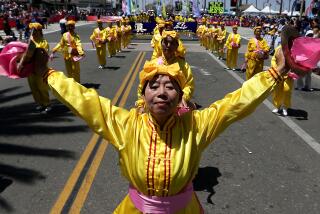Court OKs Foreign-Abuse Suits
The U.S. Supreme Court ruled Tuesday that foreigners can file lawsuits in American courts to address some abuses overseas, a decision legal experts said may provide an opening for human rights cases filed against Unocal Corp. and other companies to move forward.
By a 6-3 vote, the justices said the Alien Tort Claims Act of 1789 permits foreigners to sue in the U.S. for violations of certain international laws. The decision was the courtâs first major ruling on the obscure law that has been used successfully by Holocaust survivors and relatives of people tortured or killed under dictatorships overseas.
In the majority opinion written by Justice David H. Souter, the court said the door to alien tort suits âis still ajar subject to vigilant doorkeeping, and thus open to a narrow class of international norms today.â
Business groups had hoped the Supreme Court would eliminate the use of U.S. courts to enforce international law.
But they applauded Tuesdayâs decision nonetheless, asserting it would sharply curtail such suits.
Human rights advocates also claimed victory, saying that suits alleging corporate complicity in crimes such as summary execution, torture and slavery were exactly the type of international standards the court cited.
Lawyers on both sides predicted that the first test of the ruling would come in a celebrated case involving El Segundo-based Unocal.
Fifteen Myanmar refugees have sued the oil giant in federal court in Los Angeles, alleging that the company is liable for murder, rape and forced labor allegedly committed by soldiers guarding a gas pipeline project.
The 9th Circuit Court of Appeals was awaiting the Supreme Courtâs ruling before deciding whether the claims of the Myanmar villagers should go to trial.
Tuesdayâs decision bodes well for the villagers, said Harold Hongju Koh, incoming dean of Yale Universityâs law school and former assistant secretary of State for human rights.
A majority of the court upheld the doctrine that âallows litigants to sue for well-established violations of human rights,â Koh said. âThey essentially adopted the language of past decisionsâ by lower courts, including the 9th Circuit, in a line of alien tort suits against foreign dictators, such as the late Ferdinand Marcos of the Philippines, and their henchmen.
Chief Justice William H. Rehnquist and Justices Clarence Thomas and Antonin Scalia did not join Souterâs opinion.
âThis court seems incapable of admitting that some matters ... are none of its business,â Scalia wrote in dissent.
The opinions reflect a battle on the court over whether U.S. courts should operate in isolation or as a part of an international system of law.
The ruling came in a suit brought by Dr. Humberto Alvarez Machain, who was kidnapped in Mexico and brought to trial in Los Angeles for allegedly aiding the torture killing of a U.S. drug agent. Alvarez was acquitted of the charges against him and sued his alleged kidnappers in federal court under the Alien Tort Claims Act.
The Supreme Court rejected Alvarezâs suit, saying kidnapping was not a violation of a widely accepted international law. âA single illegal detention of less than a day, followed by the transfer of custody to lawful authorities and a prompt arraignment violates no norm of customary international law,â Souter wrote.
Paul Hoffman, a Los Angeles lawyer who represents Alvarez as well as some of the Myanmar refugees, said the slavery and forced labor allegations in the Unocal case were the type that the Supreme Court ruled merit federal court attention.
âThis is a huge victory for us,â Hoffman said. âItâs not great for Dr. Alvarez, which is a shame. But in terms of the law, itâs great. And there were six justices joining in, so thereâs no doubt about it.â
But Unocalâs lead lawyer, Daniel Petrocelli, said the allegations in the Unocal case were ordinary tort claims and did not fall under federal court jurisdiction.
The high courtâs ruling âis not a general invitation to permit ordinary tort claims to be brought under international law,â he said.
âIssues involving local labor conditions, issues involving local crimes are matters internal to the affairs of a country. These are not the sorts of claims that would be so specific that resort to international law is required.â
Petrocelli said the ruling represented âa complete vindication for the rights of American companies doing business abroad.â
âThe court made clear that there is no ability to bring suits under the alien tort statute of the sort that had been brought against American businesses and against Unocal,â he said. âHopefully the 9th Circuit will follow suit and the case will end swiftly.â
Carter Phillips, a lawyer who represented the defendant in the Alvarez case, said the Supreme Court ruling appeared to keep federal courts open to hear certain human rights violations.
But he doubts the court would sanction lawsuits against corporations that are not alleged to be the actual perpetrators.
âA lot of these claims against corporations are based on aiding and abetting theories,â he said. âBut that doesnât remotely approach suing a corporation that does business in one of those countries.â
More to Read
Inside the business of entertainment
The Wide Shot brings you news, analysis and insights on everything from streaming wars to production â and what it all means for the future.
You may occasionally receive promotional content from the Los Angeles Times.











